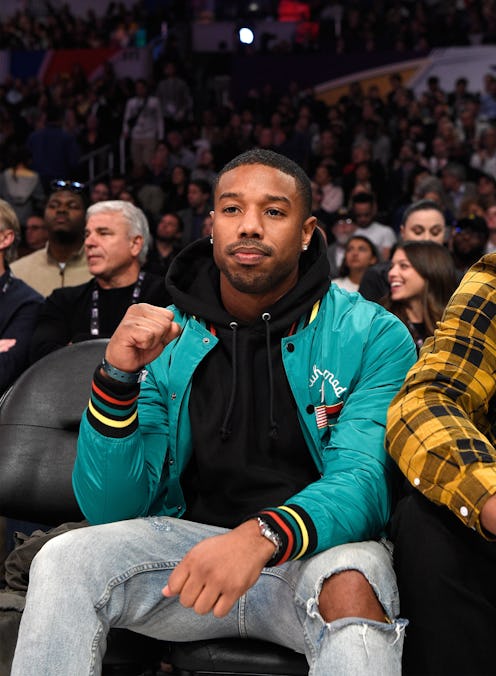Entertainment
Michael B. Jordan Just Pledged To Use Inclusion Riders & He’s Not The Only Celeb To Do It

His star has continued to rise in Hollywood, not just because of the success of Black Panther, but because of the actor's personality off the screen. Michael B. Jordan’s promise to use inclusion riders for future projects shows the kind of solidarity that Hollywood has needed for a very long time — and the conversation has also grown to include other high profile celebrities like Brie Larson, Ashley Judd, Elizabeth Banks, Jessica Chastain and Karamo Brown. Like Jordan, they have all publicly expressed support for the use of inclusion riders to promote diversity on sets.
The term "inclusion riders" has recently risen in Google search popularity following Frances McDormand's Oscars speech last Sunday night, though the movement to push for more of them was actually started in 2014 by Stacy L. Smith, Ph.D., director of USC Annenberg’s Media, Diversity & Social Change Initiatives, according to Vulture. On Sunday, asking every female nominee in the room to stand, McDormand concluded her speech with a sentence that would have the internet buzzing for days to come: "I have two words to leave with you tonight. Ladies and gentlemen: inclusion rider."
NPR describes the phrase "inclusion rider" as "a clause that actors have included into their contracts, which would require a certain level of racial and/or gender diversity within a movie productions' cast and crew." Well, Michael B. Jordan recently became one of the first celebrities to show his support, pledging to adopt the use of inclusion riders for all projects produced by his company Outlier Society on Instagram and Twitter.
Before that, shortly after McDormand's speech on Sunday night, Brie Larson announced her support and asked others to join the cause.
Hunger Games star Elizabeth Banks also showed support via Twitter, saying: "Fran McD for the f*cking WIN #inclusionrider #timesup #oscars" And Ashley Judd expressed gratitude for McDormond's call for unity, taking to social media to thank her.
Jessica Chastain recently used the tactic along with Octavia Spencer during their contract negotiations for their forthcoming comedy, and Queer Eye for the Straight Guy star Karamo Brown implements the strategy into his contracts as well. He told A&U, "I make sure that in my contract they must hire two to three gay African Americans to be on crew. I’ve done that now on the past three shows that I’ve been on and that’s important for me.”
Ahead of the highly anticipated release of her film, A Wrinkle in Time, Ava DuVernay also expressed her support for the use of inclusion riders. The Selma director told ABC News,
"I think it's a beautiful idea. And I'm really supportive of any idea that looks at ways to get more kinds of people, and more cultures, more races, more diversity and gender behind the camera. And so, good for [McDormand] for using that international platform. And now everyone's talking about it ... And maybe it'll make real change."
Though brought to mainstream attention via McDormand's moving Best Actress acceptance speech, it was Smith who initially proposed the idea in an essay for The Hollywood Reporter, writing:
"What if A-list actors amended every contract with an equity rider? The clause would state that tertiary speaking characters should match the gender distribution of the setting for the film, as long as it’s sensible for the plot. If notable actors working across 25 top films in 2013 had made this change to their contracts, the proportion of balanced films (about half-female) would have jumped from 16 percent to 41 percent. Imagine the possibilities if a few actors exercised their power contractually on behalf of women and girls. It wouldn’t necessarily mean more lead roles for females, but it would create a diverse onscreen demography reflecting a population comprised of 50 percent women and girls."
McDormand clarified the meaning behind the term while backstage at the Oscars celebration, taking care not to take credit for the movement. “I just found out about this last week," she said. "It means you can ask for and/or demand at least 50 percent diversity in, not only casting, but also the crew. And so the fact that I just learned that after 35 years of being in the film business... It changes now. And I think the inclusion rider will have something to do with that.”
Jordan is just the latest celebrity to become part of a history making change in Hollywood, and it seems safe to say that many will soon be following.